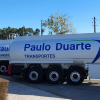

The transition to a new reality in the sector is fundamental and will only be possible through some kind of investment programme that makes use of European funds, such as the RRP.
According to the “Transport Activity” report from the National Statistics Institute (INE) for the third quarter of 2022, freight transport continues to approach pre-pandemic levels.vc This trend is not seen, however, in road transport, which, in the opposite direction, continued to decline (-3.3% compared to 2021 and -6.5% compared to 2019), with 34.5 million tonnes moved. Although the end of the year is marked by a spike in activity thanks to black friday and christmas the truth is that it will be very difficult for most businesses to recoup this year’s losses.
On the other hand, the inability to attract labour – in a sector that is considered unattractive – and the constant ups and downs of prices and the tax burden on fuel (see, for example, the rise in the Tax on Oil Products – ISP, in December, which prevented the planned decrease at the beginning of the month) still present themselves as colossal obstacles for companies in the sector. Given this frankly discouraging scenario, which has been repeated year after year without any prospect of change, the question arises for 2023: where does the future of road haulage lie?
First of all, it should be borne in mind that the transport and logistics sector is undergoing a major transformation phase to respond to new global challenges, most notably the decarbonisation of the economy and technological innovation. On the first point, it should be noted that the European Environment Agency’s latest report on Transport and Environment states that transport is responsible for around a quarter of the EU’s greenhouse gas emissions, with road transport accounting for most of these emissions, which have also increased by almost 30% over the last 30 years.
Looking at these data, there is an urgent need to invest, for example, in alternative fuels (such as synthetic fuel) and, above all, in the renewal and modernisation of fleets, since the age of the fleet is the biggest polluter. If all lorries used for freight transport were new, we would immediately achieve a 30% reduction in CO2 emissions. Even so, and due to the lack of government support in this sense, this type of investment is not yet within the reach of all companies.
But it is not only “on the ground” that technological innovation makes the difference! It is also necessary to adapt new management models in order to reconfigure chains, digitise processes and data and attract talent, thus making all operations more efficient and environmentally friendly. In this context, the attitude of companies in transforming their operations and reducing their impact, starting with the supply chain, is crucial.
Looking at all this, the digitalisation and automation of transport and logistics activity, through powerful software and management and analytical tools, are trends that are here to stay, but there is still a long way to go. This transition to a new reality in the sector is fundamental and will only be possible through some kind of investment programme that makes use of European funds, such as the RRP – which, to date, completely excludes road transport from its applicability.
Despite the fact that, in recent years, the Government has not shown interest in the need for change in this sector – with constant exclusion from State Budgets, the 2023 one being no exception – nor in protecting companies and, consequently, the Portuguese, I believe that the panorama may change in the near future. Hope is the last to die!
Source: Jornal Público


